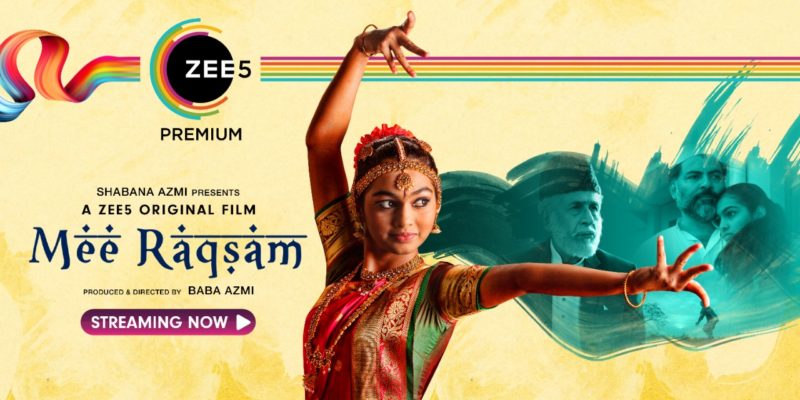When a Muslim teenager girl performs Bharatanatyam to the beats of a sufi track in front of a packed house, it is sheer magic. More so, when the girl carries an amalgamation of expressions that range from sorrow and pride to anger and disgust.
This is what makes Mee Raqsam special since it goes on an altogether different level towards its last 20 minutes. Otherwise, to think of it, to begin with the film comes across as one of those NFDC sponsored affairs that were made primarily for film festival viewings back in the early 80s.
There is a poor family where the father [Danish Husain] is nice and polite, and though with limited means wants his daughter [Aditi Subedi] to live her dream of becoming a Bharatanatyam dancer. After all, though he is a Muslim, he knows that Ganga & Jamuna are a part of Indian ‘tehzeeb’. Not everyone thinks like that though, both on the Hindus as well as Muslims side.
A chief sponsor for dance academies [Rakesh Chaturvedi Om] thinks that there is no difference between Maryam and Sultana, since all are just the same. On the other hand a self styled ‘karta dharta’ for Muslims in an Azamgarh village, Naseeruddin Shah, believes that Bharatanatyam is a dance of the Hindu ‘devdasis’ and hence not suitable for ‘kaum’.
Thankfully, there isn’t much of a sermonizing here, hence preventing Mee Raqsam from taking Khuda Ke Liye (where Naseeruddin Shah had a major role to play) route. The focus is on dance and though the beginning portions, despite the gentle approach by the dance teacher (played by Sudeepta Singh), are not really electrifying, you go with the flow. In between you have to endure some screechy performances by the ladies not quite belonging to the house, Shraddha Kaul (aunt) and Farrukh Jaffar (granny), but then you just let it go past by.
What does catch your attention is the tender relationship between the father and the daughter, something which comes quick on the heels of another such relationship seen recently between Pankaj Tripathy and Janhvi Kapoor in Gunjan Saxena – The Kargil Girl. The graph is just the same on the lines of ‘jaa beti, jee le apni zindagi’, and yet again it is all played quite naturally. Good contribution towards this tenderness is also due to supporting actors who play the autowallah (Kaustubh Shukla) and that gum chewing music loving girl (Shivangi Gautam).
Director Baba Azmi keeps it all as a very lower middle class (to later poor) setting though and one wonders whether the core plot, that of a Muslim girl learning Hindu dance, would have been compromised at all had the setting been more upscale. After all, it doesn’t quite make for much of a visual appeal when you see a family struggle to gain hold of even a hundred bucks and though one had seen something similar in Prakash Jha’s Pareeksha as well, it was fine since that was a story of an underdog. Here, it is more about religious intolerance.
There is no high decibel drama though around this conflict as a lot is conveyed by controlled delivery of some effective dialogues, the biggest violence that one sees is a stone been hurled on the window of the poor family. Otherwise, at the core of it, Mee Raqsam stays rather endearing and a lot of credit needs to go to Danish Husain and Aditi Subedi.
A theater actor, Danish has been around for a while by playing relatively smaller parts in big as well as small films. He is plain natural. On the other hand for Aditi, this is her first film and while she too approaches her part naturally, she is a different person altogether when she is on stage as a dancer. She is confident and particularly in the climax performance, she just comes up with the kind of show that is applause worthy. I for sure had a tear in my eye even as I clapped cheerfully with my heart pounding high.
Do watch Mee Raqsam, you too may end up going through the same set of emotions. And yes, just for its theme and the manner in which it tells both sides of the story with art facilitating religious tolerance, the film could be just the right candidate for earning itself a national award for Best Feature Film on National Integration.
For more latest news and updates Like us on Facebook, Follow us on Twitter and Instagram.

